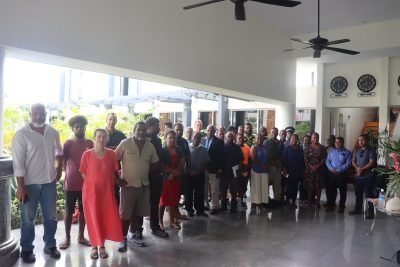National Building Standards Bill and Building Code consultations concluded
The National Government through the Ministry of Infrastructure Development (MID) has successfully concluded consultations with key stakeholders on the National Building Standards Bill and the National Building Code on Friday 28 July in Honiara.
Over the past several years, the Ministry of Infrastructure Development (MID) has been diligently working with experts, industry representatives, and policymakers to develop and refine the National Building Standards Bill.
This bill, together with the national building code aim to establish a robust regulatory framework governing the design, construction, and maintenance of buildings across the country.
Speaking at the consultation meeting, Permanent Secretary Stephen Maesiola, the National Government through his Ministry recognized the critical importance of ensuring the safety, resilience, and sustainability of our built environment.

PS MID Stephen Maesiola
Key features of the National Building Standards Bill include the establishment of the National Advisory Committee and the Chief Building Inspector. The bill, along with the building code, emphasizes stringent safety standards for all construction projects, from residential buildings to commercial complexes, to protect the lives and well-being of our citizens.
The National Building Code outlines detailed technical specifications and guidelines for construction, covering aspects such as building design, materials, electrical systems, fire safety, and more. By adhering to the National Building Code, construction practices will become standardized, leading to better-built structures and improved overall safety.
The Director of Architecture, Building, and Maintenance Services (DABMS) Phillip Baura reiterated that “with a growing focus on environmental conservation, the bill also promotes the adoption of sustainable building materials and practices to reduce our carbon footprint and mitigate the impact of construction on our ecosystem,”
“Inclusivity is also a fundamental aspect of modern building standards. The new framework, therefore, aspires to ensure accessibility to all, including people with disabilities, creating an inclusive environment for everyone,” Baura added
The Commissioner of Lands played a pivotal role in supporting this work to its current stage. In his presentation, the Commissioner of Lands highlighted the dedication and hard work put into the new framework, ensuring a streamlined application process that fosters cooperation between the Honiara City Council, the National Planning & Development Board, and MID.

Staff and participants at the closing of the meeting
PS Maesiola further emphasized the importance of continuous refinement and public engagement throughout the process.
“We have made significant strides in this endeavor,” he stated, “but we are committed to further improvements. Therefore, we are actively seeking feedback and inputs from citizens, industry professionals, and relevant stakeholders to ensure that the final version of the National Building Standards Bill and National Building Code represents the best interests of our nation,” he said.
The Ministry also extends its gratitude to previous officers who made valuable contributions to the development of the National Building Code.
“As we move forward, we believe that together, we are laying the foundation for a better, safer, and more prosperous future for our nation,” Mr Maesiola said.
ENDS
-GCU Press

